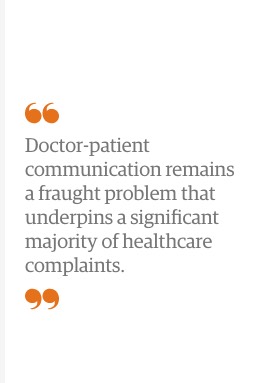Communications skills training in medicine is patchy, undervalued and not a clinical imperative – but 90% of doctors say it should be mandatory

The new patient is an elderly, diabetic lady whose heart has been teetering on the edge of failure for the past two years. She likes saying that her husband’s death broke her heart – it might have been so but at age 80, diabetes, uncontrolled hypertension and a series of heart attacks have also taken their toll. The last little while has been particularly eventful, with practically a hospital admission each month despite maximal therapy.
She sees a different physician every time to tackle her immediate problem – fluid overload on one visit, diuretic-induced dehydration the next; sky high sugars one month, dangerously low ones the next. There are short-term solutions but no overarching intent of management. Everyone, including the patient, simply skids from one disaster to the next. She looks defeated and miserable. This time, her exhausted son pulls me aside and says, “I know you are the expert, but am I alone in thinking that treatment is futile?”
He was being sensible, not cruel, as he feared. He was right that treatment was futile and what was missing was a narrative of his mother’s long illness that included death as an end point. Avoiding even the mention of mortality, we were doing the patient, her family and ourselves a disservice.
His words brought home two truths. First, that patients are entitled to more thorough explanations and better conversations about their health. Second, that we are seeing an emerging theme in medicine, where patients and families are seeking to define the boundaries of care when doctors either don’t or won’t.
In fact, the timeless business of dying has never had a higher profile, which is why the results of a recent survey by the Royal Australasian College of Physicians make for sobering reading.
The RACP end of life working party, of which I was a member, surveyed more than 1,500 physicians to identify their knowledge and practice of advance care planning and end of life care. Unsurprisingly, the majority reported routinely caring for patients who were likely to die within 12 months. On a weekly basis, one third of doctors observed provision of treatments inconsistent with known patient wishes and one-third observed treatment with little chance of benefit.
And while doctors overwhelmingly agreed that discussing end of life care was important, only a minority actually translated the intention into action. Barriers included a lack of time but just under half of the physicians felt insufficiently trained to undertake what is easily one of the most consequential conversations in the doctor-patient relationship. As a result, a dismal 17% of physicians expressed confidence in knowing the end of life preferences of their patients.
More than any other group, apart from general practitioners, physicians are expected to conduct difficult and sensitive conversations with chronically ill patients to define goals, and hence, boundaries, of care. A surgeon’s adroitness with the scalpel is best paired with the wider perspective of a physician who deliberates whether the patient will survive the operation. A tricky biopsy is within the radiologist’s reach but it’s the physician who asks whether it’s the right thing to do. This is not to diminish one speciality or elevate another but merely to acknowledge that our combined skills are necessary to provide appropriate and judicious healthcare.
When it comes to sustained communication with hospitalised patients about complex and chronic illness and helping them navigate the end of life, the burden on physicians has always been higher, which is why it’s a worry when as a group, they express uncertainty about their ability to provide this core component of care.
At the end of life, physicians are typically the doctors expected to explore your deepest longings and regrets, your strongest convictions and worst fears. In between, they deliberate resuscitation status, stop antibiotics, encourage palliation and provide counsel to the frazzled resident who says, “He is dying but the family wants everything done. How should I respond?”
 No matter how prepared one is for the end of life, for most of us there is accompanying consternation, grief and anxiety. One might reasonably expect a physician to be the custodian of good health but also the guarantor of comfort and dignity in death. It’s clear that physicians aspire to be that doctor but confess to needing help. In the survey, a staggering 90% of physicians thought that communication skills training should be mandatory.
No matter how prepared one is for the end of life, for most of us there is accompanying consternation, grief and anxiety. One might reasonably expect a physician to be the custodian of good health but also the guarantor of comfort and dignity in death. It’s clear that physicians aspire to be that doctor but confess to needing help. In the survey, a staggering 90% of physicians thought that communication skills training should be mandatory.
It isn’t, you ask. No, and it has never been. Such training in medicine, especially when it pertains to end of life care, is patchy, undervalued and considered an optional extra rather than a clinical imperative. In an era where we have mapped the human genome and talk about cancer moonshots we have consistently failed to provide not just physicians, but all doctors, with the tools to be effective communicators.
It’s often feared that in discussing mortality a doctor will extinguish hope – and there is indeed a tension between maintaining hope and telling the truth – but patients tell us they value honesty and doctors know it’s the right thing to do.
Becoming a tactful, sensitive and honest communicator is a lifelong process but it’s important enough that it shouldn’t be left to chance. But this is exactly what medical schools and hospitals largely do. And then we lament that despite all the advances in medicine, doctor-patient communication remains a fraught problem that underpins a significant majority of healthcare complaints.
Hospitals hate removing doctors from the floor because it costs money. Many are dubious that communications training can alter a doctor’s fundamental approach to patients, so they end up dealing reactively with problems.
But promoting better communication can influence organisational culture by signalling to every doctor that the difficult skill of really listening to patients is one that can be learned in the same way as suturing a wound or interpreting an ECG.
Doctor-patient communication has long been viewed as an indulgence that comes at the cost of service delivery. Fire training is mandatory as is training in cultural sensitivity. It is mandatory to know how to resuscitate a patient but not how to broach end of life care.
Patients are increasingly taking charge of their needs and concerns at the end of life and physicians will be forced to listen and respond accordingly. It’s hard to find nine out of 10 doctors agreeing over anything. If they are clamouring to become better communicators, it’s time we took note.
Complete Article HERE!
